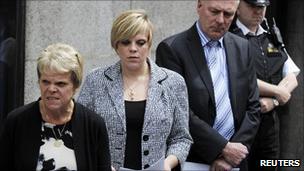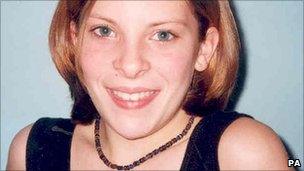Phone hacking: Milly Dowler's family 'close to £2m settlement'
- Published

Sally Dowler, her daughter, and husband Bob have not commented
News International is close to agreeing a settlement with the family of Milly Dowler as a result of the phone hacking scandal, the company has said.
The deal is thought likely to involve a personal donation of £1m to charity by company boss Rupert Murdoch, and the Dowlers would receive about £2m.
In July it emerged the girl's phone had been hacked for the News of the World.
A spokesman for News International confirmed the company was in "advanced negotiations with the Dowler family".
The family's solicitor has declined to comment.
The revelations that a private investigator had hacked into the phone after the murdered schoolgirl went missing in 2002 and deleted messages, giving the family false hope that she was still alive, brought intense pressure on News International, which responded by shutting the paper down.
Levi Bellfield was jailed for life earlier this year for murdering the 13-year-old.
BBC correspondent June Kelly said the amount of money being suggested could be a record for such a case.
'Peace and privacy'
Tom Watson, the MP who has been pushing for a full investigation of the claims, told the BBC the hacking of Milly's phone "was the most disgraceful and egregious invasion of privacy we could imagine".
He said he hoped the settlement would help the Dowler family "get some peace, and some privacy".
A spokesman for the company said: "News International confirms it is in advanced negotiations with the Dowler family regarding their compensation settlement.
"No final agreement has yet been reached, but we hope to conclude the discussions as quickly as possible."
The Dowler family has already received a personal apology from News Corp chief executive Rupert Murdoch. News Corp is the parent company of News International which published the News of the World.
The company has made settlements with other people whose phones were hacked.
In 2007, Gordon Taylor of the Football Association was given a reported £700,000 to settle a claim. The deal included a gagging order preventing Mr Taylor from discussing the case.
And in June this year, actress Sienna Miller accepted a settlement of £100,000 damages and costs from NoW, while Sky football pundit Andy Gray accepted £20,000 in damages after his voicemail was intercepted by the tabloid.
Mr Watson, who also serves on the culture committee that has questioned the Murdochs, said he thought the size of the expected compensation would "concern" News Corp shareholders.
"They were told recently the cost of the cases would be £20 million, clearly with a £2 million settlement for a single case when there were others targeted by private investigators working for News International, that sum will be dramatically more.

News of the hacking of Milly Dowler's phone led to the closure of the News of the World
Media lawyer Mark Stephens said the amount was far more than a court would have ordered, which he thought would be about £120,000.
He said Mr Murdoch was making the settlement to mark his "personal abhorrence... and the change of attitude that there has been at News International".
"It's a statement of, if you like, humility, humble pie on the part of News International."
Deputy Prime Minister Nick Clegg has said no amount of money could "absolve" the company for hacking into Milly's phone.
"The reason why people were so outraged by the invasion of the privacy of the Dowler family is that they weren't celebrities, they weren't politicians, they hadn't asked to be put on the front page of the nation's newspapers," he said.
"I have met them and they are a lovely, strong, every-day family who lost their daughter and were dealing with that terrible tragedy and even then these journalists... were invading their privacy."
'Public interest'
The Met Police launched an investigation into phone hacking, Operation Weeting, in January this year.
Last week, it made a court application to force the Guardian newspaper and one of its reporters to reveal the sources for stories about the hacking of Milly's phone.
But the Met says the application under the Police and Criminal Evidence Act was part of a separate investigation into police corruption.
In a statement, it also confirmed it was investigating whether an officer working on Operation Weeting may have breached the Official Secrets Act by passing information to the Guardian.
It added: "We also recognise the important public interest of whistle blowing and investigative reporting, however neither is apparent in this case."
Even if police find enough evidence to bring a charge under the Official Secrets Act, the attorney general still has to decide if prosecuting is in the public interest.
A spokesman for Attorney General Dominic Grieve said: "It is a matter for the police to decide how best to carry out any investigation.
"If the police provide evidence that would support a charge under section five of the Official Secrets Act the attorney general's consent would be required.
"If that stage is reached, the attorney general, with the DPP [director of public prosecutions], will consider whether there is sufficient evidence and whether the public interest is in favour of bringing a prosecution."
The Guardian has said it will resist the "unprecedented legal attack" on journalists' sources by the Met Police.